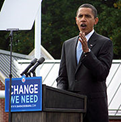The Solomon Scandals vividly depicts a city of lobbyists, crooked lawyers and other manipulators. Herbert Stone, father of Jonathan Stone, the reporter protagonist, works for a provider of PR and “public affairs” services. It’s “a nice, safe pseudo-Civil Service, so to speak, for careerists keen on abetting the more obnoxious of the corporate profiteers.”
But is this sell-out culture A Good Thing for the country at large, especially as the recession—depression?—hits other power centers such as Detroit and Silicon Valley and Washington grows even more powerful to fill the voids? More than ever we need investigative reporting to keep up with K Street (an side: while it’s been correctly pointed out that various lobbyists have moved to other locations, the term is still handy as a way to describe a certain group). But instead, due to the recession and other financial pressures, the media will probably be giving us less.
Corporate think tanks
 What’s more, corporately sponsored think tanks continue to exert a strong influence on both government and the press, which loves to print lively, ready-to-go op-eds regardless of whether they’re penned by bought journalists or academics. Simply put, the election of Barack Obama is far from a guarantee that Washington will clean up its act, even though I’m wishing him luck. America’s growing centralization could be a godsend to manipulators, who may no longer have as much need to buy off politicians at the state and local levels.
What’s more, corporately sponsored think tanks continue to exert a strong influence on both government and the press, which loves to print lively, ready-to-go op-eds regardless of whether they’re penned by bought journalists or academics. Simply put, the election of Barack Obama is far from a guarantee that Washington will clean up its act, even though I’m wishing him luck. America’s growing centralization could be a godsend to manipulators, who may no longer have as much need to buy off politicians at the state and local levels.
For what it’s worth, the number of lobbyists in D.C. doubled between 2000 and mid-2005 to more than 34,750, according to the Washington Post, “while the amount that lobbyists charge their new clients increased by more than 100 percent. Only a few other businesses have enjoyed greater prosperity in an otherwise fitful economy.”
 Perhaps it’s time for a neologism: “Solomonic”—not in the old biblical sense, but in some ways the opposite. A Solomonic business executive in the vein of Jack Abramoff uses political donations, special favors or glad-handing to win government contracts or weaken or reduce the effectiveness of regulations helpful to the public.
Perhaps it’s time for a neologism: “Solomonic”—not in the old biblical sense, but in some ways the opposite. A Solomonic business executive in the vein of Jack Abramoff uses political donations, special favors or glad-handing to win government contracts or weaken or reduce the effectiveness of regulations helpful to the public.
Such an adjective, of course, would perfectly describe Sy Solomon, the novel’s namesake, a former bricklayer with two missing fingertips, who deftly pulls strings to become the largest provider of office space to the U.S. government, while himself being used by aristocratic WASPs behind the scenes.
 The neologism may also be applied to compromised politicians or bureaucrats, to limited geographical areas such as K Street, or even to entire cities such as Washington or Versailles: ridden with courtiers or, in D.C.’s case, the modern equivalents. “Solomonic” is to honest government what “Orwellian” is to privacy.
The neologism may also be applied to compromised politicians or bureaucrats, to limited geographical areas such as K Street, or even to entire cities such as Washington or Versailles: ridden with courtiers or, in D.C.’s case, the modern equivalents. “Solomonic” is to honest government what “Orwellian” is to privacy.
Granted, Washington is much more than lobbyists; what about the large Afro-American community, for example? Unfortunately, however, on Capitol Hill and in the city’s executive suites where bureaucrats make policy, special interests all too often set the tone.
The effect of the Solomon-style manipulators on America at large: Billionaire-friendly tax cuts and other atrocities, such as laxness toward Wall Street: the kind that made the Madoff scandals possible. As shown by the better side of FDR’s New Deal, centralization has its positives (I myself am in favor of a well stocked national digital library system, with heavy participation from state and local libraries and respect for local needs). But in recent years, we’ve seen the opposite, in the form of monstrosities such as Department of Homeland Security.
A related issue—paperwork, vs. innovation: Joel Kotkin, author of the Washington Post article linked in the second paragraph here, wonders if Washington’s power brokers will prevail over innovators in the worst way. This remains to be seen. In my own little area of technical expertise, e-books, the National Institute of Standards and Technology was a constructive force in the development of badly industry standards. Of course, Kotkin might point out that NIST is into standards rather than regulations. Still, in zillions of area, such as occupational safety, maybe the country could use more paperwork. Could the Obama Administration actually be correcting an unhealthy tilt to the private side—assuming it can in fact resist Solomonic influences?
Discover more from The Solomon Scandals
Subscribe to get the latest posts to your email.


